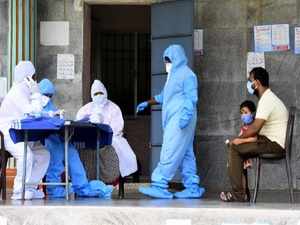
MUMBAI: Reinfection of Covid-19 has been confirmed using whole genome sequencing in four healthcare workers from Mumbai. All four have a more severe Covid-19 infection as compared to their earlier episode, according to a preprint published on The Lancet medical journal’s website.
The four reinfected patients include three doctors from the BMC-run Nair Hospital and another healthcare worker from Hinduja Hospital.
The research — conducted by the two hospitals along with the Institute of Genomics and Integrative Biology (IGIB) and the International Centre for Genetic Engineering and Biotechnology (ICGEB) in Delhi — found 39 mutations within eight genomes (four samples each of the first infection and four samples from the second infection).
“For all four HCWs (healthcare workers), the second episode had more symptoms, with constitutional manifestations and illness that lasted longer than the first episode,” said the paper whose main authors include Dr Jayanthi Shastri from Nair Hospital and Dr Sujatha Sunil from the ICGEB. “Frontline healthcare workers are exceedingly exposed to SARS-CoV-2 and reinfections are a possibility. An RT-PCR positive test does not confirm reinfection. Only whole genome sequencing (WGS) of the viral isolates from the different episodes can confirm a reinfection,” Dr Sunil said.
While the first Covid infection was asymptomatic to mild in these healthcare workers, all needed hospitalization the second time around.
None of them, however, developed breathlessness or infection in their lower respiratory tract. “This can perhaps be explained by their young age,” Dr Shastri added. One of the main aims of the paper is to underline the risk, a repeated one at that, faced by healthcare workers. “Older HCWs may experience more severe respiratory involvement,” she added.
Reinfection cases are being reported from across the world ever since the first confirmed case in Hong Kong reported a month ago.
“Phylogenetic analysis of the eight complete sequences with 52 other samples from India collected between the months of April-July revealed that these samples clustered together showing they were part of the same larger clade and aligned close to the Wuhan reference strain,” said the paper.
The team found that the reinfected staff had D614G mutation, which is known for having a spike protein that makes it easier for the virus to infect people. “The D614G mutation is associated with severe infections in people, but these youngsters were not so mild,” said Dr Sunil, adding that their second infection was “severe” only in comparison to their earlier infection.
The four reinfected patients include three doctors from the BMC-run Nair Hospital and another healthcare worker from Hinduja Hospital.
The research — conducted by the two hospitals along with the Institute of Genomics and Integrative Biology (IGIB) and the International Centre for Genetic Engineering and Biotechnology (ICGEB) in Delhi — found 39 mutations within eight genomes (four samples each of the first infection and four samples from the second infection).
“For all four HCWs (healthcare workers), the second episode had more symptoms, with constitutional manifestations and illness that lasted longer than the first episode,” said the paper whose main authors include Dr Jayanthi Shastri from Nair Hospital and Dr Sujatha Sunil from the ICGEB. “Frontline healthcare workers are exceedingly exposed to SARS-CoV-2 and reinfections are a possibility. An RT-PCR positive test does not confirm reinfection. Only whole genome sequencing (WGS) of the viral isolates from the different episodes can confirm a reinfection,” Dr Sunil said.
While the first Covid infection was asymptomatic to mild in these healthcare workers, all needed hospitalization the second time around.
None of them, however, developed breathlessness or infection in their lower respiratory tract. “This can perhaps be explained by their young age,” Dr Shastri added. One of the main aims of the paper is to underline the risk, a repeated one at that, faced by healthcare workers. “Older HCWs may experience more severe respiratory involvement,” she added.
Reinfection cases are being reported from across the world ever since the first confirmed case in Hong Kong reported a month ago.
“Phylogenetic analysis of the eight complete sequences with 52 other samples from India collected between the months of April-July revealed that these samples clustered together showing they were part of the same larger clade and aligned close to the Wuhan reference strain,” said the paper.
The team found that the reinfected staff had D614G mutation, which is known for having a spike protein that makes it easier for the virus to infect people. “The D614G mutation is associated with severe infections in people, but these youngsters were not so mild,” said Dr Sunil, adding that their second infection was “severe” only in comparison to their earlier infection.
(Catch all the Business News, Breaking News Budget 2024 News, Budget 2024 Live Coverage, Events and Latest News Updates on The Economic Times.)
...moreDownload The Economic Times News App to get Daily Market Updates & Live Business News.
(Catch all the Business News, Breaking News Budget 2024 News, Budget 2024 Live Coverage, Events and Latest News Updates on The Economic Times.)
...moreDownload The Economic Times News App to get Daily Market Updates & Live Business News.






